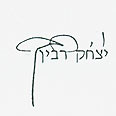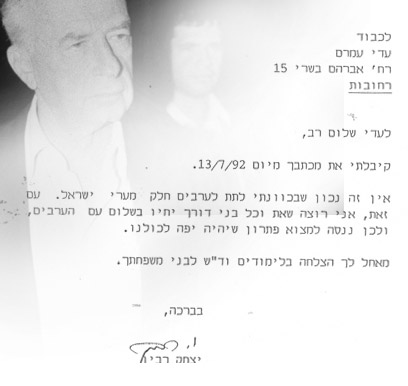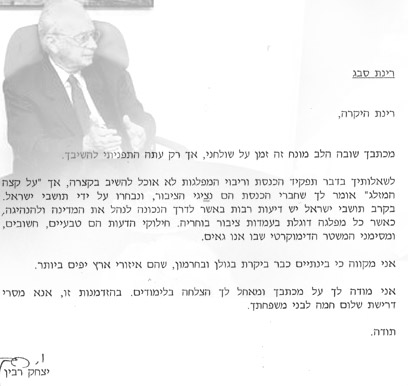
Two days before the 15th anniversary of the assassination of Prime Minister Yitzhak Rabin, Ynet delved into the state archives to reveal some of the letters the slain PM sent to citizens who contacted his office.
The appeals are wide-ranging: settlement withdrawals, the security policy, protests against holding the title of defense minister in addition to prime minister and even concern for Bosnian refugees.
July 13, 1992: On the day Rabin returned to the Prime Minister's Office, after his victory in the previous month's elections, Adi Amram's letter was waiting for him. She expressed her concerns about his intentions to "give Arabs parts of Israeli cities".
Rabin responded: "Adi, I received your letter from the 13.7.92. It is not true that I intend to give Arabs parts of Israeli cities. That said, I want you and all members of your generation, to live in peace with the Arabs, which is why we shall try to find a solution that suits everyone."

Response to Adi's letter
November 5, 1992: Three years before the assassination, Rabin takes the time to respond to a young girl's concerns about road safety: "Dearest Shani, I received and read your lovely letter; I admit that these letters fill me with joy. On the issue of road safety, I ask and expect that you and your friends be careful. Life should not be lost in a moment."
February 4, 1993: Inbal segev, then a 12 year old sixth grader from Arad, writes to the prime minister about the horrors of Bosnia. She requested that Israel open its doors to refugees. Rabin's response was filled with emotion and empathy: "Dear Inbal, Your letter from last month, filled me with emotion. I'm always happy to receive letters from young citizens who show interest and involve themselves in the world around them. Like you, I find myself unable to remain indifferent to the horrors of Bosnia, seen daily on our television screens.
"There is no doubt, that as a nation which has suffered the horrors of the holocaust, we must be sensitive to another nation's suffering. I would happily fulfill your request, and will continue to mention the issue, in my meetings with world leaders and those who can influence the issue. Meanwhile, Israel has accepted 100 Bosnian refugees, the only country to my knowledge that has done so."
Today, Segev, a special education teacher, works with disabled children at a Haifa school. In a conversation with Ynet she recalls the moment she decided t write and the events that followed: "It bothered me, so my mother helped me write the letter and express my concerns. I didn't think I'd receive a response. I was sure that one of his secretaries would write a letter. We were so excited to get the letter from the Prime Minister's Office".
She brought the letter to class, and the children discussed it. "Two years later he was assassinated. I put his letter into a scrapbook I made for a school project. I always loved him as a personality".
Now, following Ynet's discloses, Inbal says: "The truth is, I'm quite excited, it's very moving. All of a sudden I'm back with the memories and emotions I felt on the day he was assassinated. I was a teenage girl so all the emotions were extreme. A teenage girl that experiences the assassination of the leader she hoped would bring peace. I was one of the 'candle youth'; I traveled all the way to Tel Aviv for the rallies. I teach children who can't comprehend that. They note the day, but it's something different."

Summer of 1993: The Israeli government signs the Oslo Accords. Israel rages, and the right wing heads out to the streets to protest. Rabin's office begins to receive many letters all dealing with fears over the price of peace.
On January 4, 1994, Miriam Harpaz sends a letter to which Rabin answers: "It seems we are doomed to agree to disagree. That said I will fight for your right to express your opinion. I gave your letter a thorough perusal. On the issue of lines that shouldn't be crossed: The security of the State of Israel, is our un-crossable line".
Hagai Kadmon, 72, a farmer from Kfar Maimon, who was actively against the Oslo agreements, sent a number of letters to the prime minister's office, and received a response to his letter from February 10th 1993, where he wrote: "As a person responsible for the security of the citizens of Israel, we ask for safety and security for our children and our children's children. With all the respect and esteem, your role makes you responsible for the security of our children and the security of the IDF soldiers.
"I feel it is my duty to mention that I am shocked by what I have seen and heard with regards to the deterioration of the security situation, rock throwers become veiled terrorists with ease and without any response, soon they join armed groups with live fire, and still the IDF and law enforcement agencies find their hands are tied, with no orders from above to allow a war on terror.
"The frustrating phenomenon repeats itself after every terror attack, law enforcement agencies come to their senses and take proper action and immediately the order to cease and desist comes through and the failure becomes commonplace.
"I have read your letters of congratulation to the residents of Netzer Hazani as they celebrated the anniversary of the groundbreaking in Gush Katif. As defense minister, you must not be silent when you hear of soldiers who see themselves as stationary and moving targets without the ability to fight back against terror. Things must change."
February 25, 1993: Rabin responded to Kadmon's letter: "Our soldiers have clear orders about the use of firearms against rioters. The orders state that a soldier is free to open fire at any time he feels that he or those he is charged to protect are in danger. Our soldiers do a wonderful job and their accomplishments are far from being insignificant."
Today, responses are exception, not rule
Kadmon's son, who at the time lived in the Gush Katif settlement of Kfar Darom, says that "occasionally when there was an incident, and the IDF's hands were tied, we would turn to the prime minister and defense minister and say that people cannot be abandoned in this way".
Kadmon remembers the events that sparked the impulse to write the letters: "Terrorists attacked a bus, two people were killed. The issue burned within me, and I saw no one else I could turn to – if you don't go to the top, nothing gets done. Those days were filled with worry over Oslo, the possible withdrawal from the Golan and Gaza. I worried day and night, and that event was the catalyst to write the letters.
I was hoping to get some answers. It was an authentic appeal, from a farmer with family in Kfar Darom. I was hoping that appeals like mine would cause people to pause and have second thoughts, or at least share my concern and have someone take responsibility for the issue."
Rabin's reply left Kadmon unsatisfied, but he admits that personally addressed letters from the prime minister's office had a calming effect. "Today receiving a response is nearly unheard of. In this case, it was signed by Rabin himself, so even if he didn't write it, he went over it. Receiving a response reduced the heat of my anger. We had protested every week but I never helped take those protests beyond legitimate protests, even if they were a bit aggressive. "
In one letter, Rabin is asked why he continues to hold both the posts of prime minister and defense minister, he responded on March 14th 1994: "I believe that at this delicate stage of the peace negotiations with the Palestinians and the Arab nations, when weight security issues are on the table, there is an advantage to holding both positions. Thank you for you comments, even if I disagree, I respect them."
August 10, 1994: Yitzhak Rabin decides to make efforts to reach a peace agreement with Jordan. Two months before the signing ceremony on the White house lawns, Rabin visited the Arava area in the south of Israel, and afterwards sent a letter of thanks to the general staff. The letter showed Rabin's deep respect for the IDF, which he commanded during the Six Day War and returned to command as defense minister – a role he held until his assassination on November 4 1995:
"Aside from the deep impressions from our visit in Aqaba, we are left with deep impressions from the construction of the Arava border crossing between Israel and Jordan. The IDF has once again proven its abilities – this time in building a bridge to peace. Please relay my thanks to all the officers and soldiers who took part in this extraordinary effort in the battle for peace…"
- Follow Ynetnews on Facebook















